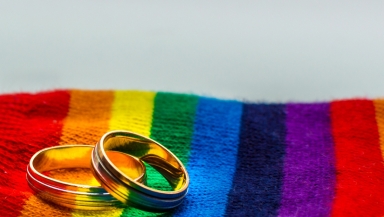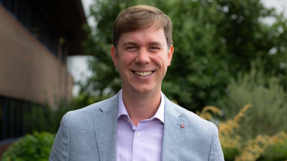
Justin Welby, former Archbishop of Canterbury, has become something of a cheerleader for ‘faithful and committed’ same-sex relationships, according to his recent speech to the Cambridge Union.
This follows Justin’s astonishing admission on the influential ‘The Rest is Politics’ podcast last year that he believed ‘commitment’ demonstrated by entering a civil partnership or being married was what mattered in relationships - gay or straight.
That increasing numbers of evangelicals now agree with Justin is of deep concern.
In plain sight
Various factors have contributed to this sexual, moral and theological revolution occurring in plain sight and observable by any who will attend. Depending on location and network, I have observed the following:
1. Don’t Ask, Don’t Tell
This is very common now in evangelical circles and is often in conjunction with a tacit or overt refusal by orthodox leaders to engage with the powerful but specious claims made by those like Justin who now challenge orthodoxy.
For some it is a case of: Genesis, Jesus and Romans is enough, end of story, move on!
I and many others agree that it is enough but some people need a little more unpacking on this. What about them?
2. Conflict avoidance
There is the pervasive ‘conflict averse’ nature of much British social, religious and cultural engagement - think ‘ostrich’ - in tandem with an overwhelming fear of being regarded by peers as ‘extreme’ or over the top.
Exhibiting such apparently unfortunate attributes would place one beyond the pale of the controlled, respectable, middle- to upper-middle class and mostly male, evangelical mainstream ‘herd’ of leaders and influencers: a form of reputational death. (In their defence, these men are aware and horrified by revisionism, but that is another topic.)
3. The influence of loved ones
The profound impact of having one’s children or grandchildren ‘come out’ as gay or transgender (‘my new name is … and my pronouns are … ’), especially if these youngsters had been devout evangelical Christians who never wanted to find themselves in this predicament, but for whom God/the Bible/Christian Union and Christian experience simply stopped ‘working’.
The gay strategists, Marshall Kirk and Hunter Madsen, noted in their book After the Ball: How America will Conquer
its Fear and Hatred of Gays in the 90s (1989) that ‘coming out’ of loved ones to their families and communities is often a gamechanger. Justin is a prime example of this.
4. Ignoring the evidence
Finally, there is the blissful ignorance of the realities of being LGBTQ and their negative consequences, thanks to mainstream (and even much Christian) media censorship, as well as the woeful ignorance and/or denial of the narratives and experiences of people who are happily ex-LGBTQ. Why do the ex-LGBTQ continue to be sidelined, even by evangelicals?
Thank you, Justin
The former Archbishop of Canterbury is right to raise issues around gay couples and their lived experience. Formerly orthodox individuals who valiantly fought (and lost) their own battles with their sexuality are victims in key respects.
Many experienced being cursed, doomed and damned, by unwanted, unasked-for attractions and feelings which appeared to emerge from nowhere in their youth.
They tried to resist, denying, fearing, loathing themselves, their same-sex attraction and/or the belief that they were born ‘in the wrong body’, but in the end capitulated to the apparently inevitable.
Justin seems aware of these tragic situations, even though this cannot justify his dramatic about-turn on same-sex attraction.
If his ‘cheerleading’ for the LGBTQ cause can have any silver lining at all, then perhaps this is it: can we start having more honest conversations here?
Where to start from
I am assuming my readers are biblically orthodox or desirous of maintaining or re-affirming an orthodox position (i.e. no sex outside of heterosexual marriage). For those needing encouragement, reassurance or answers to those unsettling ‘But what about …’ questions, Professor Robert Gagnon lays out a superb challenge here to those who would seek to undo biblical orthodoxy.
Same words, different meanings
It is important to be aware of the sexual nature of these - as Dr Jeffrey John describes them - “permanent, faithful, stable” same-sex relationships.
In reality fidelity or being 'faithful' within much of the LGBT community is not inherently or automatically sexually monogamous or ‘exclusive’ (or ‘closed’). That the term ‘exclusive’ is not used is telling.
‘Faithful’ can mean emotionally committed and sexually ‘exclusive’ or ‘closed’. But it can also mean emotionally committed and sexually non-exclusive or ‘open’: it all depends. Does Justin realise this?
To be sure, some same-sex couples will appear to be the most exclusive of all marrieds, exemplary individuals in every way, from caring for their aged parents and other needy family members to running the food bank and volunteering at the night shelter. But other couples (even the marrieds) choose to be emotionally faithful but not sexually exclusive. Yet others call themselves ‘monogamish’ - where sex with other partners is acceptable.
However, unless they ‘come out’ to the world, who knows? Their friends would (falsely) assume their sexual lives were like those of the heterosexually married, who for the most part are still bound by the norms of sexual monogamy and exclusivity.
There is a striking observation from the 2010 gay-affirming Netherlands study on same-sex marriage, 'When Gay People Get Married': “As Willem, who was married to a man, put it, ‘Fidelity is not between your legs, but between your ears’.”
Gay relationships, influencers and non-monogamy
In his 1996 book Virtually Normal, the supposedly ‘conservative’ Roman Catholic same-sex marriage advocate and influencer, Andrew Sullivan writes: “There is more likely to be greater understanding of the need for extramarital outlets between two men than between a man and a woman; and again, the lack of children gives gay couples greater freedom …
"But something of the gay relationship’s necessary honesty, its flexibility, and its equality could undoubtedly help strengthen and inform many heterosexual bonds.”
The first gay man to marry in the UK, Peter McGraith back in March 2014, echoes Andrew’s views almost 20 years later. In his 2016 article for the BBC, ‘Viewpoint: How has marriage changed life for gay people?’, Peter notes: “This experience [of ‘coming out’] of asserting a positive identity, outside of mainstream sexual morality, makes us question what we've been taught about gender … the family and the impropriety of sex. And perhaps it encourages us to have mature, rational and honest relationships.
“Over 50% of gay men's relationships are sexually non-exclusive, while lesbian women are more typically wedded to serial monogamy, which, to the surprise of some, can lead to its own problems.”
A more negative view of non-exclusivity is presented by the premier LGBT London charity, LGBT HERO, in its undated report, ‘Infidelity and the gay community: Do gay men struggle to be faithful?’
It details a survey of almost 1,000 gay men in which over half admitted to straying, while an even larger number said their partner had cheated.
Oddly, though, the counsellor cited in the report, Tiago Brandao, who belongs to the Terrence Higgins Trust, a leading UK HIV and sexual health charity, saw societal pressure and the expectation to be exclusive in relationships as part of the problem.
Psychologist Michael Radkowsky asks ‘Why do so many gay couples open up their relationships?’. Though he has an ambivalent view of non-exclusivity like Tiago above, he describes the status quo of one his married gay clients who said this:“It is painful when my husband doesn’t come home till the next morning.” And another who said, “But isn’t this how gay men have relationships? It’s what everyone around me is doing.”
Back to monogamish
The most recent development to try squaring the circle of gay men, formal and informal relationships and exclusivity, appears to be the concept and practice of ‘monogamish’.
Back in 2016, the San Francisco-based psychotherapist, Tom Moon, reported on The Couples Study which found that while there was still an emphasis on monogamy, many younger gay men were “holding the concept more loosely”, such that they could be perceived as mostly monogamous and yet not completely so.
“Many are now describing themselves as ‘monogamish’,” he wrote.
“Monogamish couples … typically have an understanding that allows for some limited sexual contact outside the relationship.
“75% of our 45 ‘monogamish’ respondents reported mostly having three-ways and always playing together as a couple. A few couples mentioned sex parties and bathhouses, but were clear they always played together … ”
He went on to say, “We need to create norms in the community, where both monogamy and non-monogamy can be rationally discussed and considered. If we can do that, both monogamous and non-monogamous couples will feel supported by the larger community.”
The popularity of non-monogamy does not appear to be waning, according to the September 2023 Advocate article, ‘While LGBTQ+ Community Embraces Open Marriages, Straight Society Is Scandalized: Poll’.
According to the poll cited in the article, when it came to the idea of open marriages, there were clear differences in acceptance rates between bisexual, lesbian and gay adults on the one hand who expressed “significantly greater acceptance, at 75 percent”; and heterosexual adults on the other hand at only 29 per cent.
“Even when accounting for age differences, this discrepancy persists,” the article noted.
Conclusion
In conclusion, same-sex relationships are of course varied. Those who consider themselves to be ‘faithful’ (i.e. emotionally committed) can be either sexually monogamous or exclusive (closed), or sexually non-monogamous or non-exclusive (open). Each couple decides and many change their minds over the course of time; for them, there is no one right way of ‘doing it’.
The reality is though that while many initially start off ‘closed’, this often does not last. As one gay man puts it, “because sex is so important to a lot of us, it is my experience that about half of our relationships - over time - are not 100% monogamous”.
“Whether married or not, many gay relationships begin to ‘open up’ after the first few years,” he says.
His observation tallies with the pathbreaking 1984 research of gay partners and mental health professionals, David McWhirter and Andrew Mattison - interestingly, their work 'The Male Couple', is still being cited decades later.
The purpose of their research was to demonstrate to the world that gay relationships can last. They studied almost 160 male couples who had been together for between one and 37 years. Two-thirds of them had initially expected their relationship to be exclusive. Yet sadly, only seven had managed this feat, and they had been together for five years or less.
These authors found that “all couples with a relationship lasting more than five years have incorporated some provision for outside sexual activity in their relationships”.
Even when these relationships are exclusive, they are essentially counterfeit marriage, as those who are heterosexually married do not have this option; the notion of ‘adultery’ still carries significant legal, moral, psychological and cultural weight i.e. it matters.
The situation is aggravated by the fact that the same vocabulary is used but with, at times, different dictionary definitions. And sadly, Justin appears ignorant that such is the case.
Sadly gay stakeholders, support groups and influential public figures do not even seem interested in seeking to ameliorate the damage within their own community by calling for monogamy (I’m not saying this would make LGBTQ relationships okay). Instead, there seems to be a prevailing ‘need’ for partnered gays to ‘open’ up at some level and be ‘monogamish’, or simply finish the relationship.
Why are these realities concerning same-sex relationships being ignored? Justin Welby seems to want to be a cheerleader for the LGBT cause, but he clearly hasn’t done his homework first.
Dr Lisa Nolland is CEO of the Marriage, Sex and Culture (MSC), Group in London.













